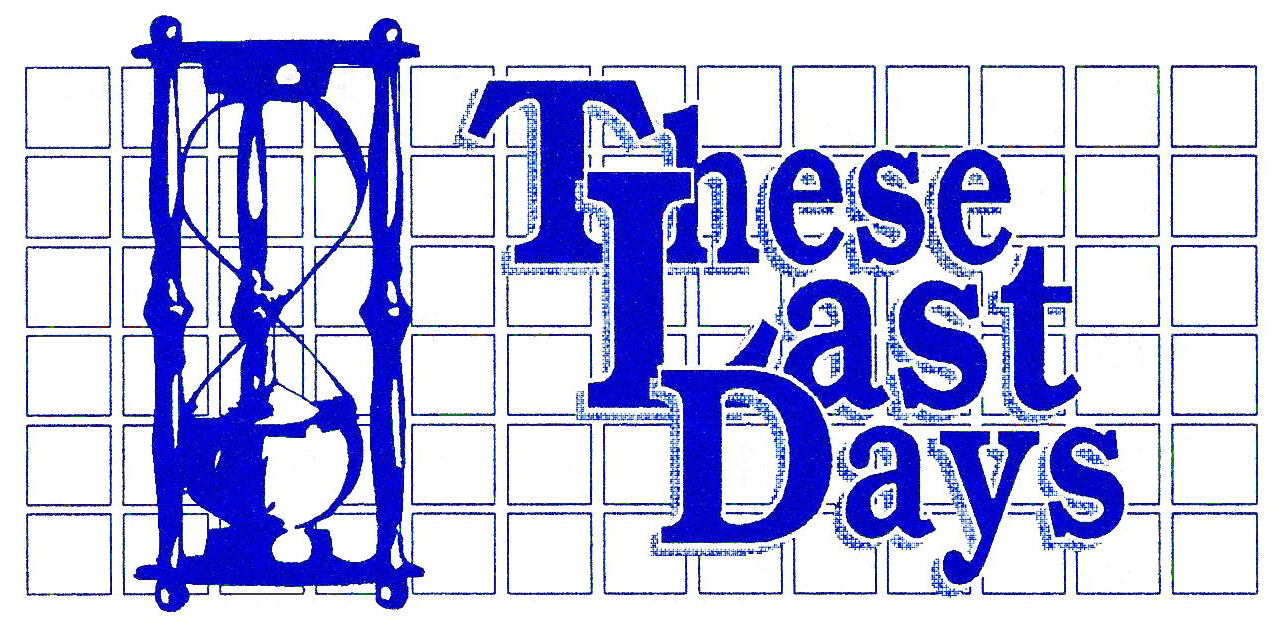|
Previous Study | Index | Next Study  How Can We Know the Future? Download PDF of this page. This is the first lesson of a thirty-two lesson course on vital issues of concern today. Featuring the major end-time prophecies and other great Bible themes, each lesson points to Scripture passages which answer today’s most important questions. To begin, you’ll need a King James Version Bible which is the textbook for the course. Each lesson contains questions and Bible references. Carefully read each question. Find the text in your Bible, and look for the answer. It might be the entire verse, but usually the question is well answered in a single phrase. Copy the necessary portion of the verse on the line provided. If you have a hard time finding the answer, first check to make sure you have the right verse. Then read the question again. If the verse still does not make sense, copy it anyway and go on to the next question. As you continue, the verses that follow should help to clarify it. When you are finished, it is always good to read through the lesson again to get the whole line of connected thought before checking the boxes on the back. 1. Who controls the course of human events? Daniel 2:20, 21 “The most High ruleth in the kingdom of men, and giveth it to whomsoever he will, and setteth up over it the basest of men.” Daniel 4:17. A nineteenth century writer once described God’s sovereignty in these words: “Above the distractions of the earth He sits enthroned; all things are open to His divine survey; and from His great and calm eternity He orders that which His providence sees best.” And God has not kept His plans secret: “Surely the Lord God will do nothing, but he revealeth his secret unto his servants the prophets.” Amos 3:7. 2. How long ago did God reveal or declare His plans? Isaiah 46:10 3. Where did the holy prophets of God in ancient times get their information? 2Peter 1:21 The Bible may be received “not as the word of men, but as it is in truth, the word of God.” 1Thessalonians 2:13. 4. What guarantee did the Psalmist give that the ancient words of God would still be trustworthy in the last days? Psalm 12:6, 7 The apostle Peter expressed his confidence in the ancient prophecies and also their importance for us today: “We have also a more sure word of prophecy; whereunto ye do well that ye take heed, as unto a light that shineth in a dark place, until the day dawn, and the day star arise in your hearts.” 2Peter 1:19. The Bereans certainly took heed to the sure word of prophecy: “These were more noble than those in Thessalonica, in that they received the word with all readiness of mind, and searched the scriptures daily whether those things were so.” Acts 17:11. 5. By what should we live our lives? Matthew 4:4 “Study to shew thyself approved unto God, a workman that needeth not to be ashamed, rightly dividing the word of truth.” 2Timothy 2:15. 6. Is it safe for us to interpret the prophecies of the Bible? 2Peter 1:20 “Do not interpretations belong to God?” Genesis 40:8. Everyone interprets the Bible differently. That’s why it is not safe to rely on anyone’s interpretation, not even your own. Do not interpret the Bible; let the Bible interpret itself. When you read something in the Bible that you do not understand, instead of trusting your own ideas, look for other Bible verses that will explain the meaning of the more difficult passage. The Bible itself tells us how it is to be studied: “For precept must be upon precept, precept upon precept; line upon line, line upon line; here a little, and there a little.” Isaiah 28:10. Thus “comparing spiritual things with spiritual,” Scripture with Scripture, we allow the Bible to explain itself. 1Corinthians 2:13. We may be tempted to think that we have a natural ability to understand God’s word, but we do not: “The natural man receiveth not the things of the spirit of God: for they are foolishness unto him: neither can he know them.” 1Corinthians 2:14. 7. Sometimes God hides things from the so-called wise, and reveals them unto whom? Matthew 11:25 8. Whom do we need to teach us? John 14:26 Whenever we study the Bible we should always pray that the Holy Spirit will direct our thoughts and help us to understand His word. 9. Is it always safe to follow what seems right to us? Proverbs 14:12 10. How are the last days described? 2Timothy 3:1 11. Evil men and seducers will abound, doing what? 2Timothy 3:13 12. False prophets shall arise and show what? Matthew 24:24 13. Their miracles are calculated to deceive whom? Matthew 24:24 14. To prevent deception, what are we to do with all our ideas? 1Thessalonians 5:21 15. According to what word are we to test all things? Isaiah 8:20 16. Whose writings must we believe in order to accept the words of Jesus? John 5:46, 47 “If they hear not Moses and the prophets, neither will they be persuaded, though one rose from the dead.” Luke 16:31. The apostles regarded the Old Testament as “the holy scriptures, which are able to make thee wise unto salvation through faith which is in Christ Jesus.” 2Timothy 3:15. “All scripture is given by inspiration of God, and is profitable for doctrine, for reproof, for correction, for instruction in righteousness: that the man of God may be perfect, thoroughly furnished unto all good works.” 2Timothy 3:16, 17. 17. What is destroying people today? Hosea 4:6 18. What is God’s word to us? Psalm 119:105 19. What is our duty regarding the light God gives? John 12:35 20. What must we do to know if a doctrine is of God? John 7:17 “The secret of the Lord is with them that fear him; and he will shew them his covenant.” Psalm 25:14. 21. What does God want to show us? Jeremiah 33:3 “Yea, if thou criest after knowledge, and liftest up thy voice for understanding; if thou seekest her as silver, and searchest for her as for hid treasures; then shalt thou understand the fear of the Lord, and find the knowledge of God.” Proverbs 2:3-5.  (Please answer YES or NO)
(Please answer YES or NO)I understand that the entire Bible is the word of God, wholly reliable, and the test of all things. I desire to diligently study the word of God, and allow it to direct every aspect of my life. Previous Study | Index | Next Study |